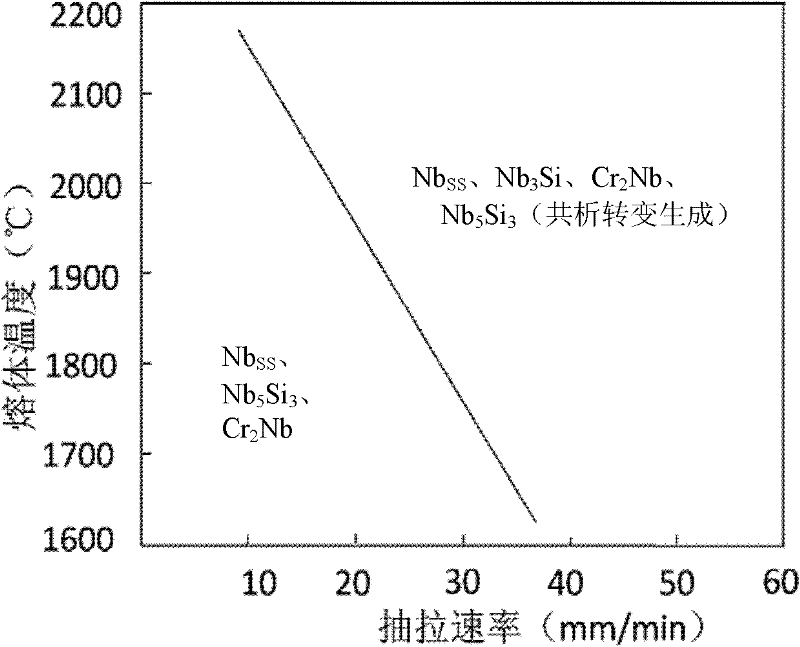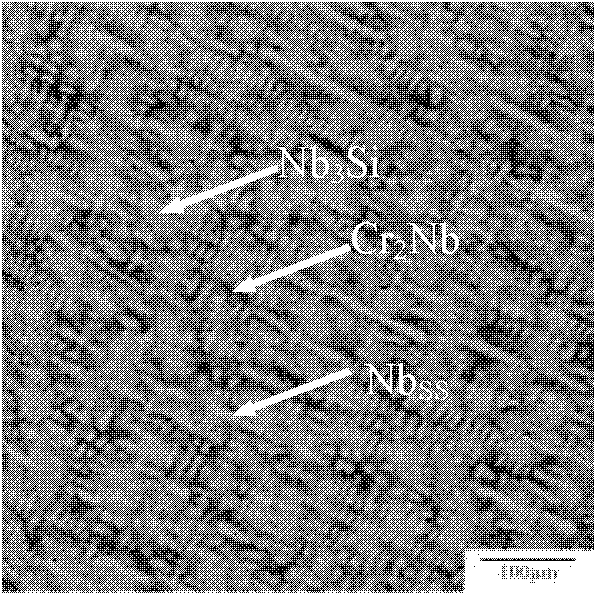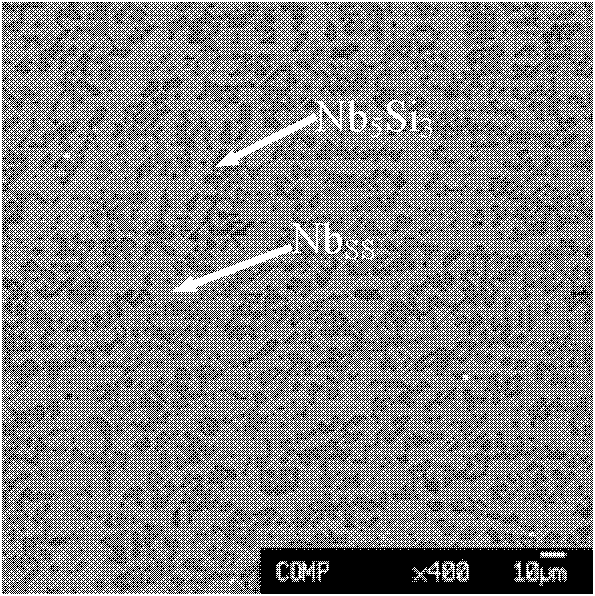Structure controlled preparation method for Nb-Si-based complex alloy
A technology of base alloy and structure, applied in the field of changing the structure of Nb-Si base multi-alloy, can solve the problems of reducing the plasticity and ductility at room temperature, smaller size, coarse structure, etc., to improve room temperature performance, reduce processing cost, Avoid performance degradation effects
- Summary
- Abstract
- Description
- Claims
- Application Information
AI Technical Summary
Problems solved by technology
Method used
Image
Examples
Embodiment 1
[0028] The nominal composition of embodiment 1 is Nb 50 Si 12 Ti 24 al 2 Cr 10 f 2
[0029] Step 1: Prepare master alloy ingot
[0030] 99.8wt% niobium (Nb), 99.9wt.% silicon (Si), 99.8wt.% titanium (Ti), 99.9wt.% aluminum (Al), 99.9wt.% chromium (Cr), 99.8wt.% hafnium (Hf) according to the nominal composition ratio;
[0031] Vacuum non-consumable electric arc furnace is used for melting, and the vacuum degree of the vacuum chamber of non-consumable electric arc furnace is 3×10 -3 Pa, then fill with high-purity argon (mass percentage purity 99.99%) to make the vacuum of the vacuum chamber to 0.5 × 10 5 Pa; the alloy ingot was repeatedly smelted four times to ensure uniform composition, and the current during the smelting process was 1300A to prepare a 1.5kg master alloy ingot;
[0032] Step 2: Cut the test rod from the master alloy ingot by wire cutting method, the diameter of the test rod is about 14mm; then use sandpaper to clean the scale on the surface of the test...
Embodiment 2
[0039] Embodiment 2 Nominal composition is Nb 48 Si 12 Ti 22 al 2 Cr 14 f 2
[0040] Step 1: Prepare master alloy ingot
[0041] 99.8wt% niobium (Nb), 99.9wt.% silicon (Si), 99.8wt.% titanium (Ti), 99.9wt.% aluminum (Al), 99.9wt.% chromium (Cr), 99.8wt.% Hafnium (Hf) according to the nominal composition ratio; the vacuum degree of the vacuum chamber of the vacuum non-consumable electric arc furnace is 4×10 -3 Pa, then fill with high-purity argon (mass percentage purity 99.99%) to make the vacuum of the vacuum chamber to 0.8 × 10 5 Pa; the alloy ingot was repeatedly smelted four times to ensure uniform composition, and the current during the smelting process was 800A to prepare a 1.5kg master alloy ingot;
[0042] Step 2: Cut the test rod from the master alloy ingot by wire cutting method, the diameter of the test rod is about 14mm; then use sandpaper to clean the scale on the surface of the test rod, wash it with acetone, and dry it at a drying temperature of 100 °C d...
PUM
| Property | Measurement | Unit |
|---|---|---|
| Diameter | aaaaa | aaaaa |
| Average length | aaaaa | aaaaa |
| Width | aaaaa | aaaaa |
Abstract
Description
Claims
Application Information
 Login to View More
Login to View More - R&D
- Intellectual Property
- Life Sciences
- Materials
- Tech Scout
- Unparalleled Data Quality
- Higher Quality Content
- 60% Fewer Hallucinations
Browse by: Latest US Patents, China's latest patents, Technical Efficacy Thesaurus, Application Domain, Technology Topic, Popular Technical Reports.
© 2025 PatSnap. All rights reserved.Legal|Privacy policy|Modern Slavery Act Transparency Statement|Sitemap|About US| Contact US: help@patsnap.com



